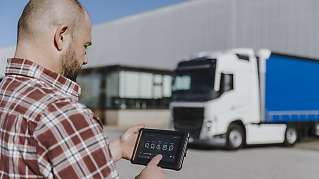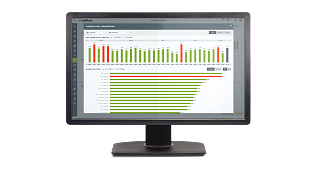Fleet fuel efficiency
Cut your fuel costs and operate more sustainably








Fuel efficiency is a cornerstone of effective fleet management. Do you have questions about transforming your approach to fuel management? Then you’ve come to the right place. This page covers everything you want to know, from factors that impact fuel consumption to strategies that can help improve your fleet’s fuel efficiency.
All you need to know about fleet fuel efficiency
What is fuel efficiency?
Fuel efficiency is a crucial factor for both environmental sustainability and economic savings. It measures the distance a vehicle can travel on a single litre of petrol or diesel, reflecting the vehicle's ability to convert fuel into distance traveled.
Optimal fuel efficiency is achieved at moderate speeds; for most passenger cars and light commercial vehicles (LCVs), this is approximately 40 to 50 miles per hour. At this speed range, the engine operates in its most efficient state, balancing power and fuel consumption. Surpassing 50 mph typically results in increased aerodynamic drag, which demands more power from the engine and, consequently, more fuel.
Maintaining moderate speeds is not only beneficial for fuel economy but also supports efforts to reduce your environmental impact.


How is fuel efficiency measured?
Fuel efficiency is a critical metric for assessing vehicle performance, particularly in terms of environmental impact and cost-effectiveness. Officials typically use metric data to measure fuel efficiency: litres per 100 kilometres (L/100 km). This standard allows for a consistent comparison across various vehicle types. However, the calculation of fuel efficiency is not uniform; it is influenced by multiple factors, including:
- Vehicle type: Different designs and purposes lead to varying fuel needs
- Weight: Heavier vehicles typically consume more fuel
- Tyre performance: Well-maintained tyres with optimal pressure can improve fuel efficiency
For heavy commercial vehicles (HCVs) towing trailers, the average fuel consumption is estimated at 30 L/100 km. An HCV consumes roughly 39,000 litres of fuel annually.
Why is fuel efficiency important?
Studies show that fuel represents up to 38% of a fleet's total cost of ownership. So, fuel efficiency is key to cutting operational costs.
A fuel-efficient fleet is also a more sustainable one: the more efficiently your vehicles consume fuel, the more you reduce your fleet's carbon emissions. This is because improved fuel efficiency directly correlates with reduced emissions, helping to mitigate your fleet's impact on the environment.


Factors impacting fuel efficiency
A number of factors influence a fleet’s overall fuel efficiency. Here are the most urgent ones you’ll want to consider:
- Driving behaviours like speeding, idling and harsh braking
- Keeping vehicles in roadworthy condition with regular maintenance
- Route planning that avoids traffic congestion and construction zones
- Ensuring that tyres are in optimal health, with no slow leaks
- Systematically tracking fuel so you can pinpoint where to take action
You can improve fuel efficiency with digital tools that help optimise driver performance, route planning, vehicle maintenance and tyre health. With a fleet management system like Webfleet, analysing real-time and historical data on fuel consumption can be done directly from your account dashboard.
A comprehensive strategy to increase fuel efficiency
To drive fuel efficiency, you need insights into your fleet’s fuel consumption patterns. You’ll also need to know which actions will yield the best results. When combined into a cohesive strategy, the following tactics can make a remarkable difference in your fuel savings. It’s worth noting that the strategic actions described below leverage a fleet management system.
- Get real-time insights on your fuel consumption: Need a clear understanding of your fleet's fuel consumption? Connect your trucks’ FMS or CAN bus to a fleet management system, so you can analyse fuel use at the trip level. Concerned about possible theft or unusual losses? Your fleet management system will send alerts on low fuel levels, enabling you to take swift action.
- Analyse your fleet’s fuel use over time: Gauge fuel consumption over time with historical data on your fleet management dashboard. Do you notice any anomalies or exceptions in your fleet’s historical fuel consumption patterns? These standout trends signify where to focus efforts for greater fuel savings, such as vehicle performance, driver coaching or route optimisation.
- Give your drivers access to professional navigation: Ensure your drivers stay on the safest, most efficient routes—better fuel efficiency requires avoiding congested areas, construction zones and bad weather. Webfleet's PRO Driver Terminals, for example, provide accurate traffic information and truck-specific navigation so your drivers can avoid inappropriate roads and low bridges.
- Use active driver coaching: Support your drivers with in-vehicle feedback and advice. Webfleet offers a range of PRO Driver Terminals that empower drivers to adapt their performance in the moment. Audio-visual messages help drivers prevent fuel-wasting habits like idling, speeding and improper gear shifting.
- Train drivers on cruise control: Determine which drivers could use more cruise control training. When you use Webfleet, it’s easy to see where cruise control is engaged via a green map tracing—or just by accessing the trip report. With better use of cruise control, drivers keep their foot off the gas pedal more.
- Schedule in regular vehicle maintenance: Save more fuel with well-maintained vehicles. When your trucks are running at their best, they're running more fuel efficiently. Schedule in regular maintenance to keep engines, tyres and other truck parts in top shape. Get diagnostic alerts and automate maintenance tasks.

Maximise your fuel efficiency
Discover how to save fuel and cut operational costs — book a demo






Your consent is required
In this section, external content is being embedded from .
To display the content, your consent is required for the following cookie categories:
- Targeted Advertising
- Analytics & Personalization
- Essential
For further details, please refer to our privacy policy. If you are interested in how ###vendor_name### processes your data, please visit their privacy policy.








